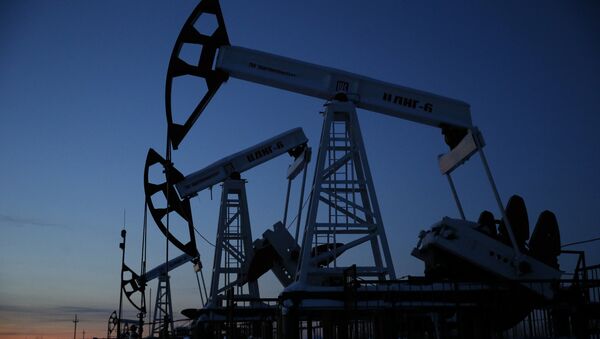WASHINGTON (Sputnik) — On Sunday, representatives from 18 major oil-producing countries met in Doha, Qatar to discuss a draft deal to freeze oil production amid falling energy prices.
However, Iran refused to attend the Doha talks while a number of OPEC countries, chief among them Saudi Arabia, reversed previous positions and rejected the deal.
"The best strategy for the Saudis and others is to fight for market share," Brown University Professor and author of "Petro-Aggression: When Oil Causes War," Jeff Colgan, told Sputnik on Monday.
Most OPEC member states, Colgan noted, are loath to cut volumes because boosting prices right now would only throw the US tight oil industry the lifeline it needs.
Many of these same countries are also so desperate for fiscal revenue that cutting oil production levels is simply not an option, hence OPEC’s focus on market share.
"A freeze is not realistic," Colgan claimed. "Either the Saudis are being stupid… or they know Iran can't freeze and are using that as an excuse not to act."
Tradition Energy Senior Analyst Gene McGillian told Sputnik the competition between Tehran and Riyadh is so intense that Saudi Arabia is willing to take a hit on price rather than lose market share to Iran, itself showing no signs of slowing down.
"The Iranians said they were going to raise production levels to 4 million barrels per day, which were their pre-sanction production levels, ever since this talk of a freeze started," McGillian explained.
In 2014, McGillian added, the Saudis and other Gulf states instituted a policy to maintain market share regardless of what happens to oil prices, and the Doha meeting shows that they are standing by this decision.
Adding to his doubts, McGillian noted, is the fact that two weeks ago Saudi Arabia and Kuwait announced they were reopening a joint oil field project that would produce 300,000 barrels of oil per day, making it hard to believe they were committed to freezing production.
Oil Price Information Service Global Head of Energy Analysis Tom Kloza told Sputnik that the Doha meeting was doomed to failure in light of the rancor between Saudi Arabia and Iran as well as the ongoing projects to boost production and exports within OPEC.
"I believe we’ll see more Iranian oil and more Iraqi oil, with the possibility that we may get more Iraqi oil as the pipeline in Kurdistan gets back into action," Kloza suggested.
Kloza said he cannot imagine the Iranians agreeing to freeze output, given they can argue that other countries were beneficiaries for several years while Tehran’s exports were limited by sanctions.
The only solution to the crisis of oversupply and falling prices is patience, Kloza claimed.
There is also the possibility, Kloza added, that some production in geopolitically challenged countries will be stunted.
"Venezuela is a prime candidate for output issues, given the lack of reliability in its electric grid and the festering unrest," Kloza concluded.
The US government has sent Special Envoy Amos Hochstein to Kuwait, Qatar, Egypt and Israel to discuss falling oil prices after the failure of the Doha energy talks, the US Department of State announced in a media note on Monday.
Global oil prices plunged from $115 to less than $30 per barrel between June 2014 and January 2016, hitting their lowest levels since 2003 amid the ongoing glut in global oil supply.



